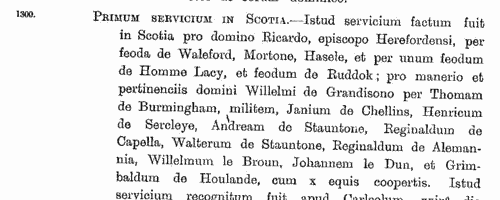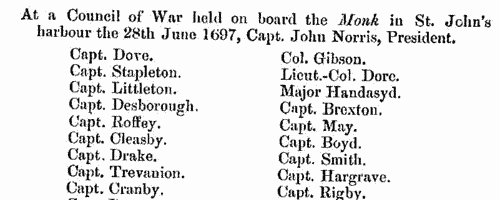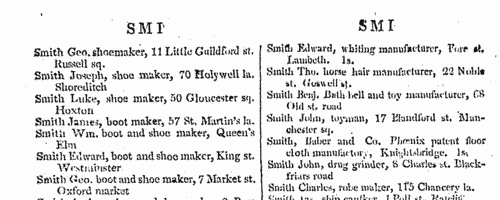Feversham Surname Ancestry ResultsOur indexes 1000-1999 include entries for the spelling 'feversham'. In the period you have requested, we have the following 14 records (displaying 1 to 10): Buy all | | | Get all 14 records to view, to save and print for £68.00 |
These sample scans are from the original record. You will get scans of the full pages or articles where the surname you searched for has been found. Your web browser may prevent the sample windows from opening; in this case please change your browser settings to allow pop-up windows from this site. Grantees of offices, commissions and pardons
(1272-1281)
The Patent Rolls are the Chancery enrolments of royal letters patent. Those for the 1st to the 9th years of the reign of king Edward I (29 November 1272 to 17 November 1281) were edited for the Public Record Office by J. G. Black, and published in 1901. The main contents are royal commissions and grants; ratifications of ecclesiastical estates; writs of aid to royal servants and purveyors; and pardons. FEVERSHAM. Cost: £2.00.  | Sample scan, click to enlarge

| Norfolk Feet of Fines
(1196-1307)
Pedes Finium - law suits, or pretended suits, putting on record the ownership of land in Norfolk. These abstracts were prepared by Walter Rye.FEVERSHAM. Cost: £4.00.  | Sample scan, click to enlarge

| Clerks and Clergy in Herefordshire, Shropshire and Gloucestershire, Berkshire, Dorset and Wiltshire
(1283-1317)
The register of bishop Richard de Swinfield of Hereford, containing general diocesan business. Hereford diocese covered almost all Herefordshire, southern rural Shropshire, a westward arm of Worcestershire, and a northwestern slice of Gloucestershire. The register also includes ordinations from the diocese of Salisbury (then covering Berkshire, Dorset and Wiltshire) for 1284-1291.FEVERSHAM. Cost: £6.00.  | Sample scan, click to enlarge

| Close Rolls
(1441-1447)
The close rolls of the 20th to 25th years of the reign of king Henry VI record the main artery of government administration in England, the orders sent out day by day to individual officers, especially sheriffs of shires: they are an exceptionally rich source for so early a period. There is also some material relating to Wales, Scotland, Ireland and the English possessions in France. FEVERSHAM. Cost: £4.00.  | Sample scan, click to enlarge

| Traders in Canterbury
(1392-1592)
No man or woman could trade in the city of Canterbury without having obtained 'freedom' of the city, unless they paid an annual fee to do so. Admissions of freemen were recorded on the Chamberlains' Accounts of the city, which were prepared annually from Lady Day (25 March) to Lady Day until 1752, and thereafter each set runs from 1 January to 31 December. The accounts for 1392 are incomplete, but thereafter until 1800 there is a complete series except for the years 1455 to 1457 and the year 1552-3. Joseph Meadows Cowper, Honorary Librarian to the Corporation, transcribed and privately printed in 1904 the lists of the Intrantes - those persons, not being free of the city, who paid the annual fine to trade - for the period 1392 to 1592. The names are arranged by ward (Burgate, Newyngate, Westgate, Worgate and Northgate, and give full name, (sometimes) occupation, and fee paid. FEVERSHAM. Cost: £4.00.  | Sample scan, click to enlarge

| Allegations for marriages in southern England
(1687-1694)
The province or archbishopric of Canterbury covered all England and Wales except for the northern counties in the four dioceses of the archbishopric of York (York, Durham, Chester and Carlisle). Marriage licences were generally issued by the local dioceses, but above them was the jurisdiction of the archbishop, exercised through his vicar-general. Where the prospective bride and groom were from different dioceses it would be expected that they obtain a licence from the archbishop; in practice, the archbishop residing at Lambeth, and the actual offices of the province being in London, which was itself split into myriad ecclesiastical jurisdictions, and spilled into adjoining dioceses, this facility was particularly resorted to by couples from London and the home counties, although there are quite a few entries referring to parties from further afield. The abstracts of the allegations given here usually state name, address (street in London, or parish), age, and condition of bride and groom; and sometimes the name, address and occupation of the friend or relative filing the allegation. Where parental consent was necessary, a mother's or father's name may be given. The ages shown should be treated with caution; ages above 21 tended to be reduced, doubtless for cosmetic reasons; ages under 21 tended to be increased, particularly to avoid requiring parental consent; a simple statement 'aged 21' may merely mean 'of full age' and indicate any age from 21 upwards. These are merely allegations to obtain licences; although nearly all will have resulted in the issuing of the licence, many licences did not then result in marriage. FEVERSHAM. Cost: £4.00.  | Sample scan, click to enlarge

| House of Lords Proceedings
(1697-1699)
Private bills dealing with divorce, disputed and entailed estates: petitions, reports and commissions: naturalisation proceedings.
FEVERSHAM. Cost: £4.00.  | Sample scan, click to enlarge

|  Masters of Apprentices registered in Suffolk
(1741-1745) Masters of Apprentices registered in Suffolk
(1741-1745)
Apprenticeship indentures and clerks' articles were subject to a 6d or 12d per pound stamp duty: the registers of the payments usually give the master's trade, address, and occupation, and the apprentice's father's name and address, as well as details of the date and length of the apprenticeship. There are central registers for collections of the stamp duty in London, as well as returns from collectors in the provinces. These collectors generally received duty just from their own county, but sometimes from further afield. (The sample entry shown on this scan is taken from a Norfolk return)FEVERSHAM. Cost: £8.00.  | Sample scan, click to enlarge

|  Masters of Apprentices
(1757) Masters of Apprentices
(1757)
Apprenticeship indentures and clerks' articles were subject to a 6d or 12d per pound stamp duty: the registers of the payments usually give the master's trade, address, and occupation, and the apprentice's name, as well as details of the date and length of the apprenticeship. 1 January to 31 December 1757.FEVERSHAM. Cost: £8.00.  | Sample scan, click to enlarge

| Traders and professionals in London
(1805)
Holden's Triennial Directory for 1805 to 1807 includes this 'London Alphabet of Businesses, Professions, &c.': coverage is good; about 30,000 individuals are recorded.FEVERSHAM. Cost: £4.00.  | Sample scan, click to enlarge

|
| 1 | 2 |  |
Research your ancestry, family history, genealogy and one-name study by direct access to original records and archives indexed by surname.
|













